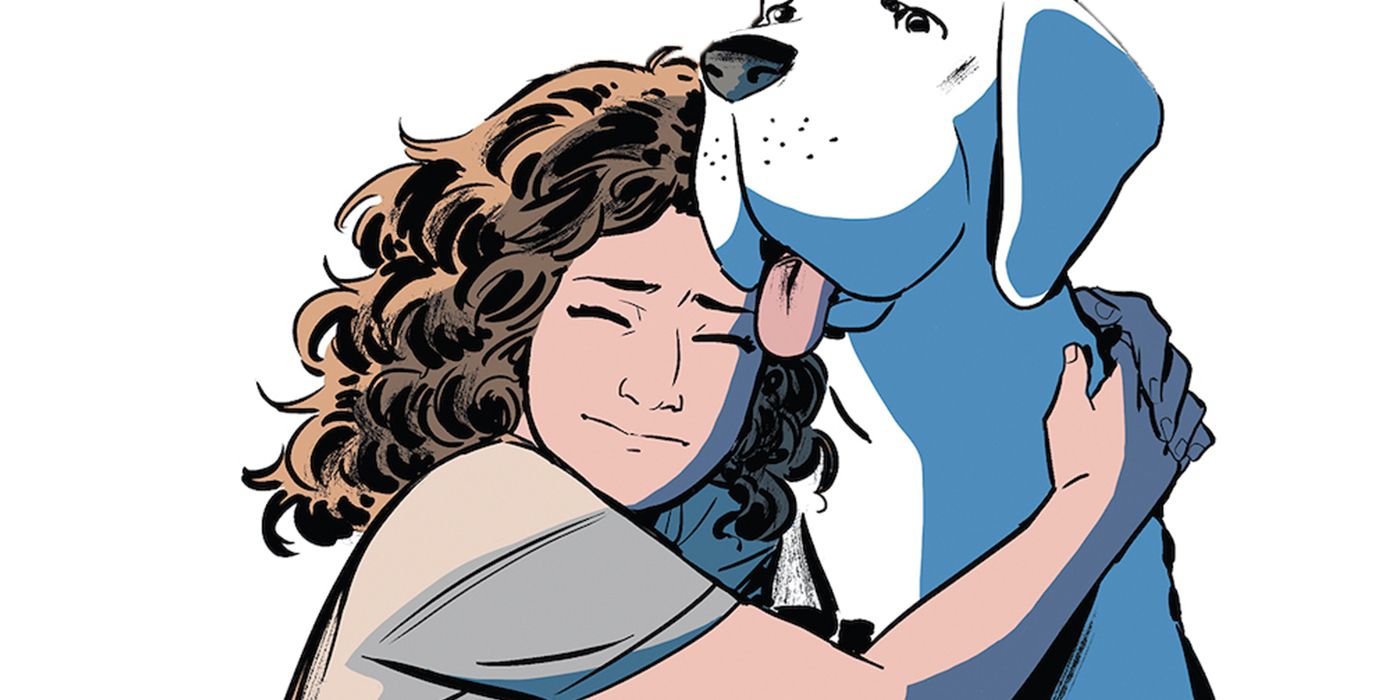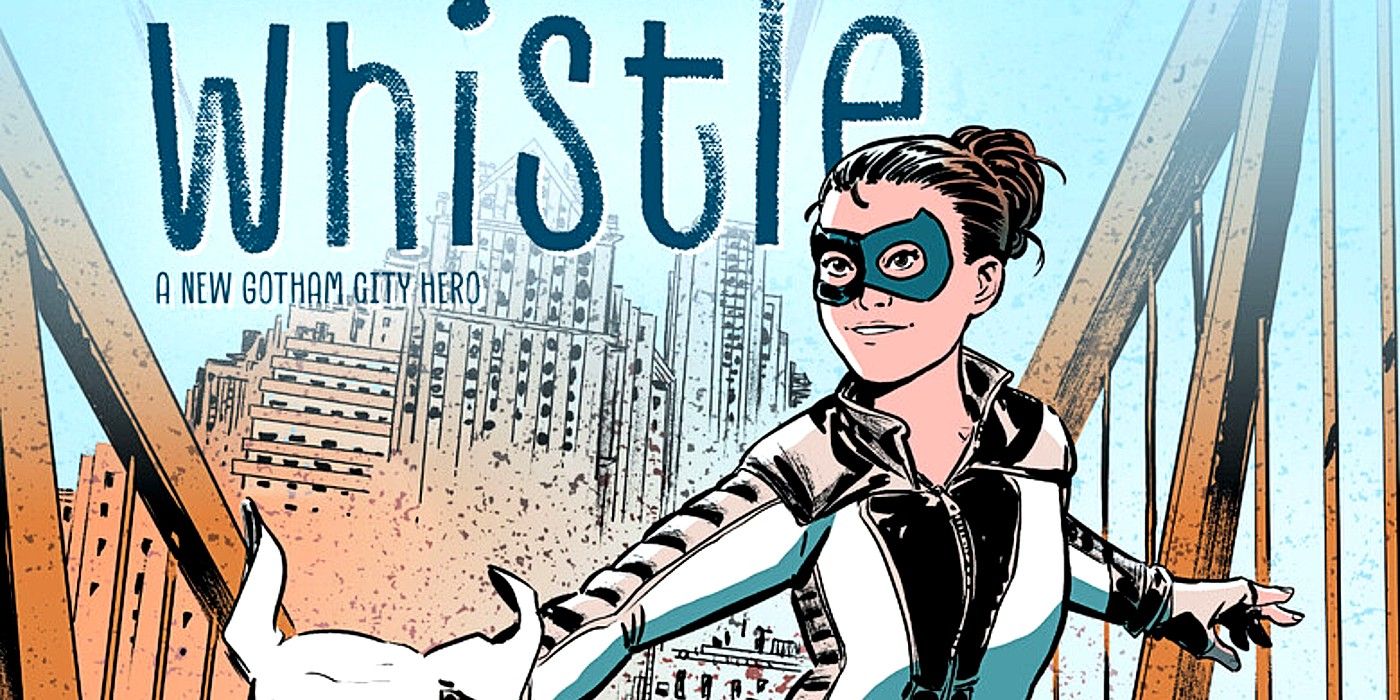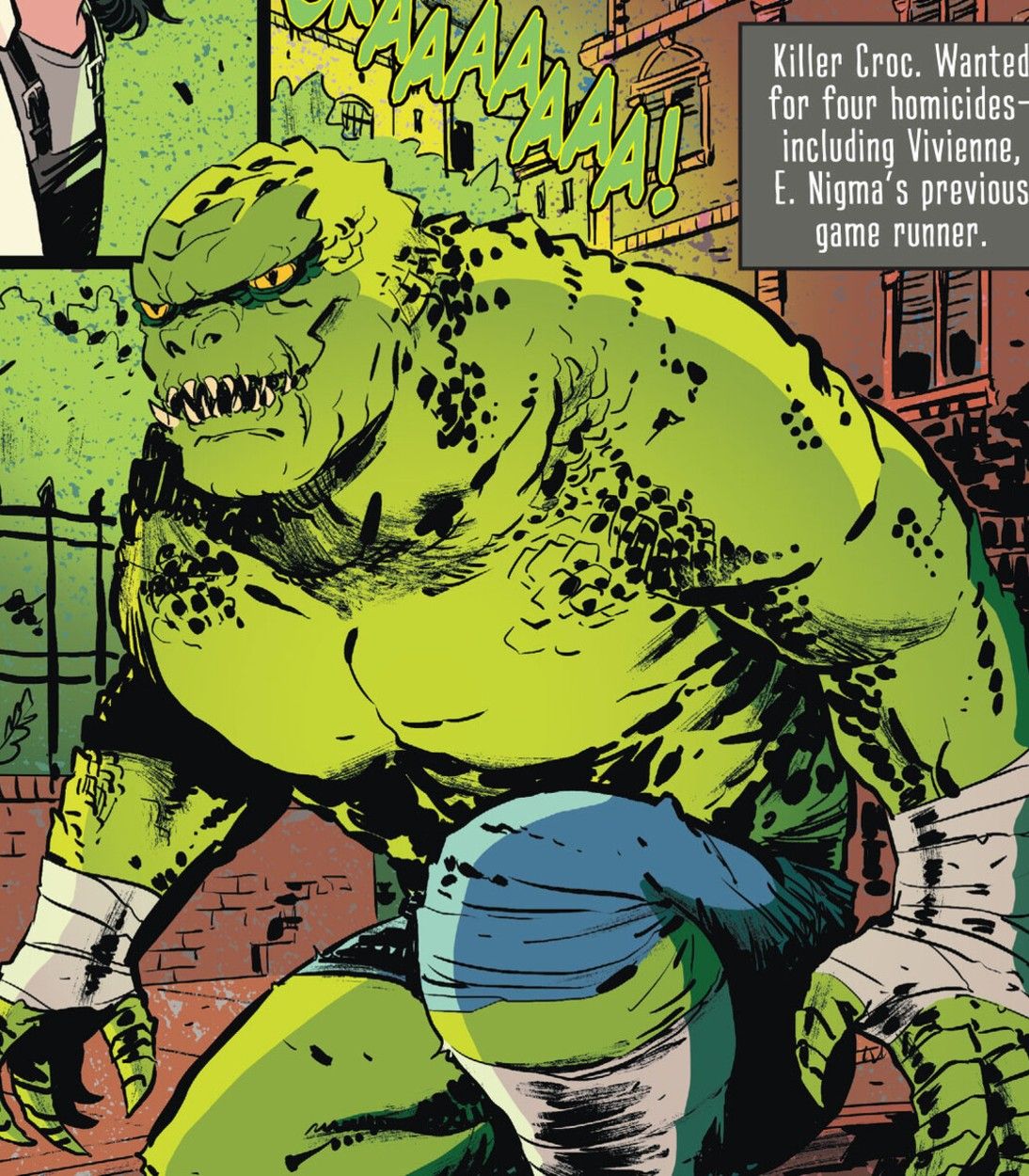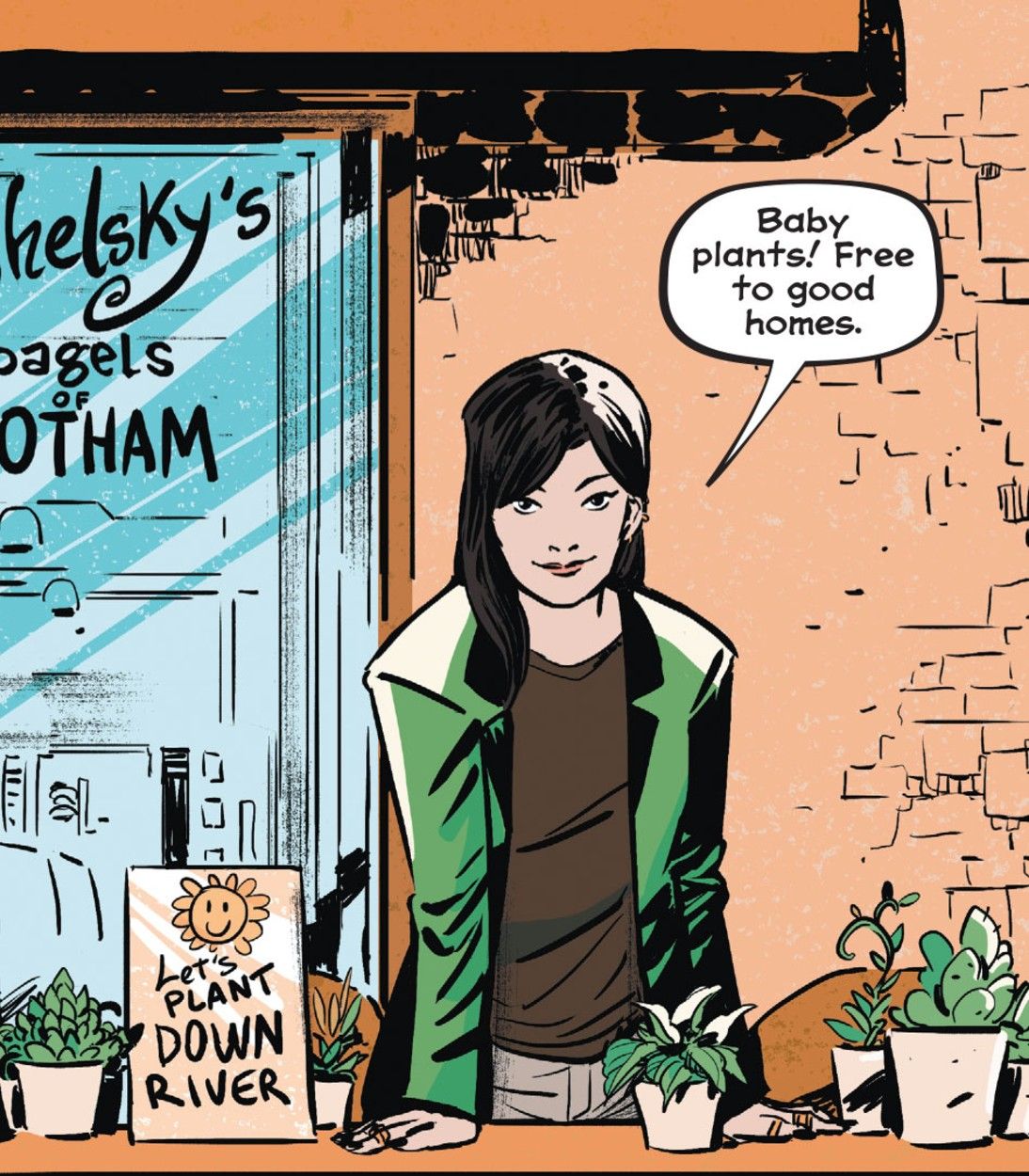In Whistle, the newest young adult graphic novel from DC Comics, a young girl named Willow Zimmerman tries to navigate an increasingly challenging life in Gotham while gaining the power to talk to her great Dane, Lebowitz. The new story features Willow becoming a hero, as she takes up a job alongside some of DC's biggest villains who have a surprise connection to her life.
In Whistle by E. Lockhart (We Were Liars, Genuine Fraud) and Manuel Preitano (The Oracle Code), Willow Zimmerman is a 16-year-old social activist, who lives in the Gotham City neighborhood, Down River. With her mother revealing she can't afford to continue to afford her cancer treatments, Willow is offered a job by the Riddler, who was a former friend of her mom. Along the way, she'll gain powers and become a hero alongside a great Dane, Lebowitz, encountering reimagined takes on some of DC's most notable villains, including Poison Ivy and Killer Croc.
We spoke with E. Lockhart about working with DC Comics for the first time, what it was like to create a new hero in Gotham City, and why it was important to characterize Willow as a social activist.
How did you connect with DC on this project?
E. Lockhart: I was at Library Con, which is - if it still exists - a conference for librarians who are specifically into pop culture: comic books, young adult literature, all kinds of other things that might be going on at libraries for youth markets and adult. And I was on this crazy panel that was like trivia day, and there was a guy in an Obi-Wan Kenobi robe asking all these trivia questions. I didn't know the answer to any of them, but it was really fun. I had done this kind of fun, kitschy wild thing, and I was signing books afterwards. Then these two editors from DC came up and just said, "Here are our cards. Would you like to get on the phone with us?" Quite a long story short, the next time I was in LA, I went into their offices and the archivist gave me a tour of the archives. The DC Comics archives are full of first editions, original art, and movie memorabilia. And there's a bust of Nicolas Cage from when he was gonna be Superman - he never was Superman, but he was scheduled to be. Really fun geeky, book history, comic stuff. And it was just absolutely my jam. By the time I was done with this archive tour, I was really excited about writing in this world that has meant so much to so many people over so many years all over the planet. I had this sense of like, "Oh, my gosh. These stories have not only meant so much to me as a kiddo, but have meant so much to so many people for so long. Yes, I do want to be a part of this." And then they said, "Would you like to invent a superhero for us?" And I was like, "Oh, is that what we're talking about? Yes, thank you, please. I wouldn't do that."
What is it like to have an original creation that takes place in Gotham City and features a murderer's row of villains? I'd love to hear the inspiration behind Willow.
E. Lockhart: Willow Zimmerman starts out life as a teenager in this neighborhood of Gotham City that I invented, Downriver, a historically Jewish neighborhood that's now more mixed and is also pretty rundown. She's an activist and an athlete, and she is supporting her single mother whose health is terrible and who's lost her job. She's in a tough place.
I wanted to write a character who reflected not just my experience as a kid with Jewish heritage - my mom is not Jewish, but my dad is Jewish - growing up in a household with a single mother. But more importantly, I wanted to portray the activism and civic engagement of the teenagers that I live with now in New York City. Those kids are protesting and making zines and writing blogs and finding a million ways to try to be a force for good in the world. When I was a teenager, I just wanted to make out with boys, and that was my biggest goal.
All of that is to say, I wanted to create a hero who reflected that kind of teenager out in Gotham City. What would that be like? What would be the temptations for a teenager in Gotham City? And with this murderers' row of supervillains running around in Gotham, I think there might be some really exciting temptations.
So, Willow goes to work basically for the Riddler - though she does not know he is the Riddler when she goes to work for him, but he has a very expensive and glamorous lifestyle. He needs somebody to run his Subterranean Poker Night, and she becomes that person for a very large weekly paycheck. It changes her family situation radically, and the temptations of that underworld are sexy and fun. The money makes a positive and a negative difference in her life. I was interested in the lure of corruption for a teenager in Gotham, as well as the activist response that a teenager in such a hot mess of a city might naturally have.
Why was Manuel Preitano the perfect artist for this project, and how did he bring life to this book?
E. Lockhart: I think the number one thing that makes Manuel amazing is that he brings so much heart and relationship nuance to the art while still being very playful. He brought a lot of the relationships into full flower with his pictures.
We also had a really fun time with Willow's superhero costume when she becomes Whistle. And we went through a long process where he drew me like 7 million different outfits, and we shared things on Pinterest like pictures of speed skaters and Simone Biles and Rihanna in a super sexy tracksuit, and so on. We were looking for powerful images of women that we could combine into a superhero costume that would be cosplay friendly, and also realistically teenagery.
Though it's a book set in a superhero world, it's very grounded in socioeconomic and sociopolitical realism. Yes, she takes this cushy job with the Riddler, but it's because she's living under the weight of astronomical medical bills. I think it draws a really nice line between temptation and activism. For young adults, how important is it to have that message in books like this?
E. Lockhart: I've been a longtime comic book reader. I love superhero stories generally, in multiple formats. But I'm most interested when it is grounded in relationships, and in moral compromises or questions; gray areas, and things that need debating. I don't think that vigilanteism is an easy and clear moral choice. So, I get most excited when I see films where the power comes with a cost: a cost in relationships or cost in the life that you're going to lead.
I really liked Black Widow for that reason. I felt like I, for the first time, really got the complicated cost of the incredible gift of being Black Widow. How lonely that life is, and how big the wounds are that you carry, even when you know those wounds made you awesome. To me, that's where it's really meaty and interesting, so I just leaned into that every place I could.
Speaking specifically about her powers, how did Liebowitz and the decision to make Whistle’s powers connected to her come about?
E. Lockhart: Well, it started with wanting a superhero dog sidekick. Because if I was a superhero, that is what I would want: a really big Great Dane to pal around with and talk to. Then I did a little bit of research, and Liebowitz is the first-ever superhero dog that is female. There are not very many, and there are no mainstream super popular heroes with canine powers. There are lots of cat-related people; wolf-related people even, but not dogs.
And I think that's because dogs are domestic, and they're kind of ordinary. But also because doggy type superhero powers can be a little bit ick, you know? You want to smell everybody's butt, and have everybody pet your tummy and fetch things? This is not super attractive, necessarily. That said, dogs are incredibly fast and strong. And Willow's powers, basically, are super-powered hearing and smell, as well as the ability to call an army of dogs.
If you've seen The Suicide Squad, which I'm sure you have, you realize that calling an army of animals is the best superpower ever if you actually put it to good use. Not having encountered Ratcatcher before writing Whistle, I love the idea of having an army of dogs at your command. And that seemed to be an incredible power that you could call upon in a variety of smart ways.
I also leaned into the IQ of the dog superpower, and I thought that was perfect for a teenage person getting powers. Because when you're a teenager and your body is changing with adolescence, you already have some weird stuff going on in your body that is super intense. Some of it is awesome, and some of it is ick. You have to renegotiate your relationship with your body, so getting superpowers can be a metaphor for those kinds of adolescent changes; that renegotiation of the self and the body. So, the dog stuff worked well for that.
What about Willow's relationship with the three main villains: Nigma, Poison Ivy - who I thought was delightful - and Killer Croc, who obviously played more of a straight role as a villain in this book?
E. Lockhart: Yeah, Killer Croc just makes a brief appearance. But I picked those characters because they all work as dark mirrors for Whistle.
Killer Croc is a person with possibly icky animal powers, as is she, and he perceives himself as protector of this Downriver neighborhood where he and she both grew up. He's protecting it by going on a murder spree, and she is trying to protect it in a more wholesome way, but they have the same mission.
Poison Ivy is, in some ways, a great role model for a young woman. She has a Ph.D. in botany, she's very ambitious, she's very fashionable, she's very generous with her time and ideas, and she cares about the planet. But of course, she is an ecoterrorist as well and doesn't care about people so much as plants. So, I was interested in how sympathetic Ivy might be to a young girl who was looking for a role model.
That was a relationship I spent a lot of time thinking about. What would it be like to meet this person in our street clothes? You would think she was just incredible and so admirable. And then to realize that the things she doesn't care about make all the difference in the world to the way she treats her passions. Poison Ivy conceives of herself as a hero, whereas some other villains do not conceive themselves that way. But she certainly does, and I found that really interesting as a mirror for Whistle and what's going on with her.
The Riddler's in an interesting place in his life, in terms of his former relationship with Willow's mother, and the fact that he is initially shown as having turned his life around. But you learn that the darkness inside the Riddler doesn't just disappear.
E. Lockhart: No, it doesn't. It rears its head again. He's always been up to some naughty stuff, the Riddler. He is just so much fun, am I right?
DC said, "You do not need to be canonical with these characters. You can invent them and their backstories, as long as it's recognizably Poison Ivy and recognizably The Riddler. You have some free rein."
Again, I was interested in what makes a guy like that tick, and what might be the best sides of his personality. He's incredibly clever, and he's incredibly erudite and knowledgeable about art and the world - and that's very appealing to Willow. And he used to be friends with Willow's mother in college. Her mother goes on to become a professor of Jewish history and culture, and Enigma goes on to be his own lunatic self.
But I thought about where they would have overlapped in college, and I had the idea that he was a bit of a party boy while she was more of a library geek, but they created these incredible scavenger hunts together. They had this incredible sense of intellectual play; that's where they would overlap. And I was willing to believe that. I was more the library geek in college, but I had friends who maybe flamed out and didn't have the easiest lives because of it later. But I love those people.
Thanks to E. Lockhart for taking the time to chat with us. Whistle will be available to read on September, 7th.




